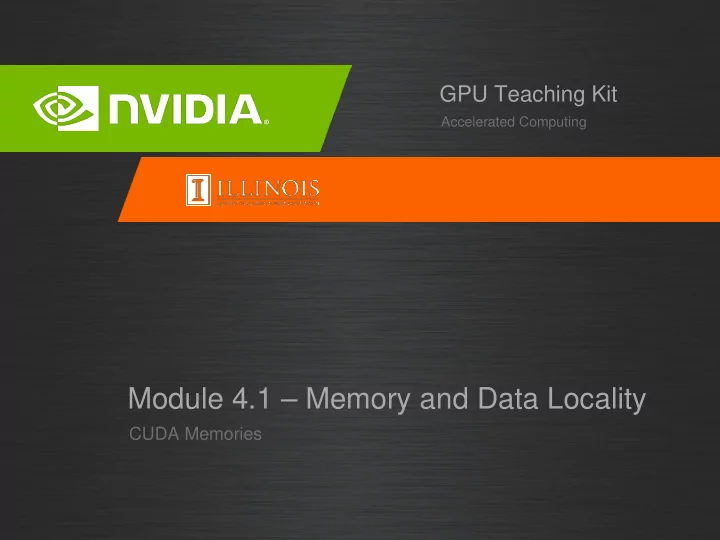

GPU Teaching Kit Accelerated Computing Module 4.1 – Memory and Data Locality CUDA Memories
Objective – To learn to effectively use the CUDA memory types in a parallel program – Importance of memory access efficiency – Registers, shared memory, global memory – Scope and lifetime 2 2
Review: Image Blur Kernel. // Get the average of the surrounding 2xBLUR_SIZE x 2xBLUR_SIZE box for(int blurRow = -BLUR_SIZE; blurRow < BLUR_SIZE+1; ++blurRow) { for(int blurCol = -BLUR_SIZE; blurCol < BLUR_SIZE+1; ++blurCol) { int curRow = Row + blurRow; int curCol = Col + blurCol; // Verify we have a valid image pixel if(curRow > -1 && curRow < h && curCol > -1 && curCol < w) { pixVal += in[curRow * w + curCol]; pixels++; // Keep track of number of pixels in the accumulated total } } } // Write our new pixel value out out[Row * w + Col] = (unsigned char)(pixVal / pixels); 3
How about performance on a GPU – All threads access global memory for their input matrix elements – One memory accesses (4 bytes) per floating-point addition – 4B/s of memory bandwidth/FLOPS – Assume a GPU with – Peak floating-point rate 1,500 GFLOPS with 200 GB/s DRAM bandwidth – 4*1,500 = 6,000 GB/s required to achieve peak FLOPS rating – The 200 GB/s memory bandwidth limits the execution at 50 GFLOPS – This limits the execution rate to 3.3% (50/1500) of the peak floating-point execution rate of the device! – Need to drastically cut down memory accesses to get close to the1,500 GFLOPS 4
Example – Matrix Multiplication N WIDTH M P BLOCK_WIDTHE WIDTH Row BLOCK_WIDTH WIDTH WIDTH Col 5
A Basic Matrix Multiplication __global__ void MatrixMulKernel(float* M, float* N, float* P, int Width) { // Calculate the row index of the P element and M int Row = blockIdx.y*blockDim.y+threadIdx.y; // Calculate the column index of P and N int Col = blockIdx.x*blockDim.x+threadIdx.x; if ((Row < Width) && (Col < Width)) { float Pvalue = 0; // each thread computes one element of the block sub-matrix for (int k = 0; k < Width; ++k) { Pvalue += M[Row*Width+k]*N[k*Width+Col]; } P[Row*Width+Col] = Pvalue; } } 6
Example – Matrix Multiplication __global__ void MatrixMulKernel(float* M, float* N, float* P, int Width) { // Calculate the row index of the P element and M int Row = blockIdx.y*blockDim.y+threadIdx.y; // Calculate the column index of P and N int Col = blockIdx.x*blockDim.x+threadIdx.x; if ((Row < Width) && (Col < Width)) { float Pvalue = 0; // each thread computes one element of the block sub-matrix for (int k = 0; k < Width; ++k) { Pvalue += M[Row*Width+k]*N[k*Width+Col]; } P[Row*Width+Col] = Pvalue; } } 7
A Toy Example: Thread to P Data Mapping Block(0,0) Block(0,1) Thread(0,1) Thread(0,0) P 0,0 P 0,1 P 0,2 P 0,3 BLOCK_WIDTH = 2 Thread(1,0) P 1,0 P 1,1 P 1,2 P 1,3 Thread(1,1) P 2,0 P 2,1 P 2,2 P 2,3 P 3,0 P 3,1 P 3,2 P 3,3 Block(1,0) Block(1,1) 8
Calculation of P 0,0 and P 0,1 N 0,0 N 0,1 N 1,0 N 1,1 N 2,0 N 2,1 N 3,0 N 3,1 P 0,1 M 0,0 M 0,1 M 0,2 M 0,3 P 0,0 P 0,1 M 1,0 M 1,1 M 1,2 M 1,3 P 1,0 P 1,1 9
Memory and Registers in the Von-Neumann Model Memory I/ O Processing Unit Reg ALU File Control Unit PC IR 10
Programmer View of CUDA Memories Grid Block (0, 0) Block (1, 0) Shared Memory Shared Memory Registers Registers Registers Registers Thread (0, 0) Thread (1, 0) Thread (0, 0) Thread (1, 0) Host Global Memory Constant Memory 11
Declaring CUDA Variables Variable declarat ion Memory S cope Lifet ime int LocalVar; regist er t hread t hread __device__ __shared__ int S haredVar; shared block block __device__ int GlobalVar; global grid applicat ion __device__ __const ant __ int Const ant Var; const ant grid applicat ion – __device__ is optional when used with __shared__ , or __constant__ – Automatic variables reside in a register – Except per-thread arrays that reside in global memory 12
Example: Shared Memory Variable Declaration void blurKernel(unsigned char * in, unsigned char * out, int w, int h) { __shared__ float ds_in[TILE_WIDTH][TILE_WIDTH]; … } 13
Where to Declare Variables? Can host access it? global register constant shared Outside of In the kernel any Function 14
Shared Memory in CUDA – A special type of memory whose contents are explicitly defined and used in the kernel source code – One in each SM – Accessed at much higher speed (in both latency and throughput) than global memory – Scope of access and sharing - thread blocks – Lifetime – thread block, contents will disappear after the corresponding thread finishes terminates execution – Accessed by memory load/store instructions – A form of scratchpad memory in computer architecture 15
Hardware View of CUDA Memories Global Memory I/ O Processing Unit S hared Register Memory ALU File Control Unit PC IR Processor (S M) 16
GPU Teaching Kit Accelerated Computing The GPU Teaching Kit is licensed by NVIDIA and the University of Illinois under the Creative Commons Attribution-NonCommercial 4.0 International License.
Recommend
More recommend